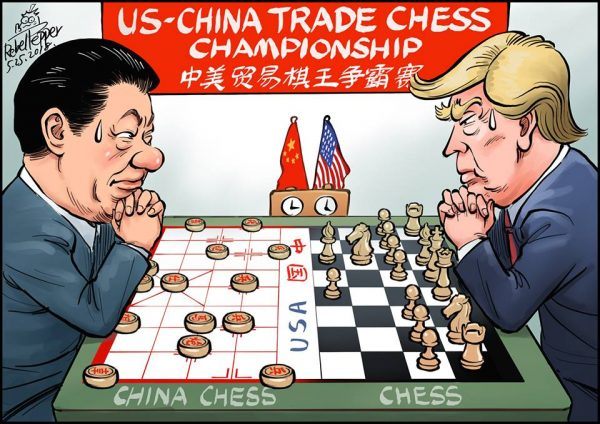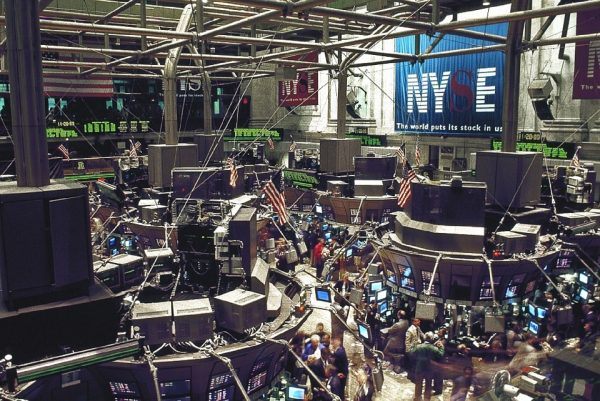By all appearances, we are now in a “trade war” with China. President Donald Trump recently announced his intent to impose a 10 percent tariff on over $200 billion of Chinese goods coming into America (imports). In response, China announced on June 19th, 2018 that it would retaliate against any tariff imposed by Trump.
The concern now is that this “trade war” could very well escalate into a dispute that could disrupt global trade and economic growth. But to downplay the fear, we have multiple talking heads going on air to tell us how this is a good thing.
Gordon Chang went on Newsmax and had this to say: President Donald Trump’s threat to impose a 10 percent tariff on $200 billion of Chinese goods, triggering a tit-for-tat trade war with Beijing, is “extremely good news for the United States…China has been stealing hundreds of billions of dollars in U.S. intellectual property each year and previous administrations have…not done anything. President Trump is doing something.”
Then we have Peter Navarro, the top White House trade adviser, saying that Beijing “may have underestimated the resolve of President Donald J. Trump” by refusing to meet U.S. demands on trade and by threatening to retaliate against American trade sanctions.
But that could be expected; Navarro is well-known for his “hard-line” stance with China. While President Trump discussed the tariff on over $200 billion in Chinese goods, Navarro went further and stated publicly that “our phone lines are open; they have always been open.” But China needs to come to the table and “resolve the dispute” before we impose further tariffs on up to $450 billion in Chinese products.
Navarro went on to say that “this is a trade dispute—nothing more, nothing less,” adding “President Trump has a great relationship with President Xi [Jinping of China].” Well, I take a personal bias against the word “dispute.” The actions taken by both parties are more indicative of a trade war than a trade dispute.

Even many senators are joining up on the “Trump Train.” Consider Senator Dean Heller from Nevada.
“He says we have an $800 billion trade deficit now,” the Nevada Republican said during an interview on Fox News‘ “America’s Newsroom.” Sen. Heller added,”What do you have to lose? I’m going to give him a wide berth now. He is sending a message to China and the rest of the world, this can’t continue.”
“Look at the message he is sending to China,” said Heller. “I believe they’ll come to the table within weeks, not months, hopefully. What the president has done for this economy. It has been incredible. I got a report back from the governor’s office last week. We’re creating 40,000 jobs per month in the state of Nevada. No state has benefited more from the jobs act and the tax cuts than the state of Nevada. We’re moving in the right direction.”
In Nevada, tax cut legislation has meant an average of $2,500 more a year in paychecks, said Heller, which will help people with college tuition expenses and put food on their tables.
But the Chinese are not taking these actions lightly, nor are they taking them sitting down. In fact, the Chinese Commerce Ministry went on record criticizing Trump’s actions, stating emphatically that Beijing is ready and able to “defend the interests of the Chinese people and enterprises… If the U.S. side becomes irrational and issues the list, China will have to adopt comprehensive measures in quantity and quality in order to make strong countermeasures.”
Of course, this statement should come as no surprise given the amount of support many “enterprises” in China receive from their government. You see, one of China’s favorite tactics is to subsidize a company so that they can dump their products on the United States until the competitors can no longer compete, at which time this company takes over the market and begins to raise prices.
This is causing all sorts of uncertainty in the markets and creating havoc for many manufacturers. But thankfully, so far, the pain has been limited to the sellers and importers of the goods specifically targeted by the U.S. and Chinese tariffs. That could change, or it could bleed out into the global economy.
Up until now, China has simply followed Trump’s actions with a “tit-for-tat” policy. They simply match tariff hikes with an identical charge on the same amount of imports. But there is a huge lopsided amount of trade in favor of the United States; Beijing doesn’t import enough American goods to match Trump’s threats.
Consider: according to the United States Census Bureau, China imported only about $130 billion in American goods last year. By comparison, China sold (exported) over $505 billion in goods to the Untied States. That still leaves over $375 billion available for retaliatory tariffs after Trump’s latest announcement.
But why are we stuck in this trade war to begin with? Well, the latest dispute and posturing is part of a larger U.S. position that global trading conditions are unfair to the United States and there is nothing “free” about the “free trade” agreements we have with other nations. Thus, Trump has also raised duties on steel, aluminum, washing machines, and solar panels from Canada, Europe, Japan, and South Korea. Then there is also the argument of China stealing intellectual property.
Yet there is an issue that no one is currently talking about, and it could very well be the equivalent of a financial “nuclear bomb.”

While the United States has a huge trade imbalance with China that we can take advantage of, China has their own retaliatory weapon. Consider that when President Trump announced his intention of placing tariffs on over $200 billion of imports from China, it was a figurative Pearl Harbor attack on their economy.
As we stated above, China imports less than $154 billion from the United States. So when Trump announced a $200 billion tariff proposal, it left zero room for China to retaliate. A bold and masterful stroke. Because even if China imposed a tariff on every single penny that it imports from the US, it will still lose the trade war.
But therein lies the problem. We have backed China into a no-win situation. Now, thankfully, talks are under way and hopefully a resolution can be found. This is par for the course in regards to President Trump’s negotiation style, and congrats to the president for taking action and forcing China to the negotiation table.
Given the massive trade imbalance, China is out of options. So, left with no other choice, China is going to retaliate the only way they can. It’s the financial nuclear bomb. China will have no choice but to start dumping U.S. treasuries. Who is the largest holder of U.S. treasuries, you ask? Well, if you answered China, you answered correctly.
China currently holds approximately $1.29 trillion in U.S. treasuries, notes, and bonds.
If China starts dumping its incredible stockpile of U.S. holdings, it can (and will) drive U.S. bond prices into the ground. And this will spell doom for our economy. With bond prices in a tail spin, who will buy? And if we can’t sell our notes, bonds, and treasuries, how do we reconcile the massive $21 trillion dollars of debt we currently have?
Think I am an alarmist? Well, think again. The exodus from U.S. treasuries has already begun. In March and April of 2018 alone, China dumped $5.8 billion in U.S. treasuries. If China were to dump just 10 percent of their holdings, it would devastate the bond market. Bonds are already falling in several failing European countries and, mark my words, if something doesn’t happen soon, the U.S. bond market is next.
“Mr. Trump seems to be counting on the fact that China will soon run out of room to retaliate with its own tariffs on U.S. exports,” says Eswar Prasad, a trade expert at Cornell University quoted in The New York Times. “This could prove to be a miscalculation, since China has other effective levers it can use in a trade war.”
So while the trade war and the tariffs are all the news, keep your eyes on the bond market, because whether we like it or not, China holds all the strings, and this presents a clear and present danger to our national security and stability.
Let us hope that this is, in fact, President Trump doing what President Trump does best—forcing people to the negotiating table in order to make America great again.
















